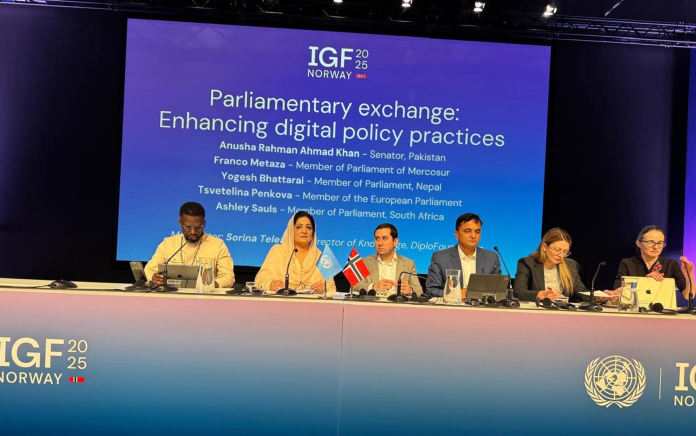NORWAY: JUN 25 (DNA):Speaking on the parliamentarians panel on “Enhancing Digital Policy Practices”, Senator Anusha Rahman shared her views on Citizens Rights in Global Digital Landscape and introduced Senate of Pakistan journey towards adapting Artificial Intelligence to facilitate legislation.
She stated that in Digital ecosystem, there are no borders, the internet does not recognize flags or fences. What happens online in one part of the world can, and does, affect lives everywhere. That is why digital policy must also be a space for international cooperation, not just domestic regulation. She emphasised that Digital tools are neutral by design, but not by consequence. They can enlighten and educate, but they can also manipulate and divide. And our job, as lawmakers, is not to suppress this force, but to guide it responsibly. Not to over-regulate, but to facilitate wisely, in ways that protect freedoms without leaving our citizens defenseless in the face of online harm.
A profound responsibility weighs on parliaments, to ensure that digital progress upholds human dignity, democratic freedoms, and equal access for all.
At the heart of digital governance lies the principle of shared management. No single actor can navigate this space alone and governments, legislators, civil society and the private sector can collectively reflect, learn, and act.
In Pakistan, we are taking steps to enhance parliamentary capacity, from developing in-house AI tools to building awareness on digital ethics and citizen data protection.
To explore the promise and challenges of AI in shaping the future of legislation, transparency, and bringing more efficiency and effectiveness in the functioning of the Senate of Pakistan. Therefore, enhancing this vision, Chairman Senate, Syed yusuf raza gillani has taken concrete steps toward developing an AI-powered Senate ChatBot—a virtual assistant designed to support Senators, Secretariat staff, and citizens with real-time access to legislative data, procedural guidance, and multilingual services.
Anchored in values of accountability, efficiency, and inclusion, the ChatBot will be tailored to the specific needs of the Senate of Pakistan.
Talking further on online rights of citizens, She appealed to the participating parliamentarians to work on a secure digital future for their citizens where their online and offline rights are same and protected. To collectively draw advancing rights-based frameworks that seek to protect vulnerable groups, especially women, girls, children and marginalized communities, from online abuse, whilst safeguarding the right to dissent, access information, and digital participation, which are essential elements of any democratic society.
Sharing the concerns with many other representatives, she also confirmed that Pakistan witnesses to date practical non cooperation from many Social Media platform when they ate demanded enforcement of our laws- it is still an option in the hands of social media platforms whethers to act on our request and is not our compulsory right.
Therefore, likeminded sovereign nations need to collaborate and design a digital policy framework as a cohesive exercise to protect citizens online.
Parliaments have a unique role in translating complex digital realities into meaningful legislative action. This requires ongoing peer learning, stronger ties with the technical and academic communities, and more robust internal capacities with a firm belief that together the soveriegn nations can draw an effective charter for ensuring online rights of our citizens according to the laws of their respective lands. senator Aslam Abbro ,Falak Naz and pakistani Ambassador in Norway Sadia Altaf were also participated.

















